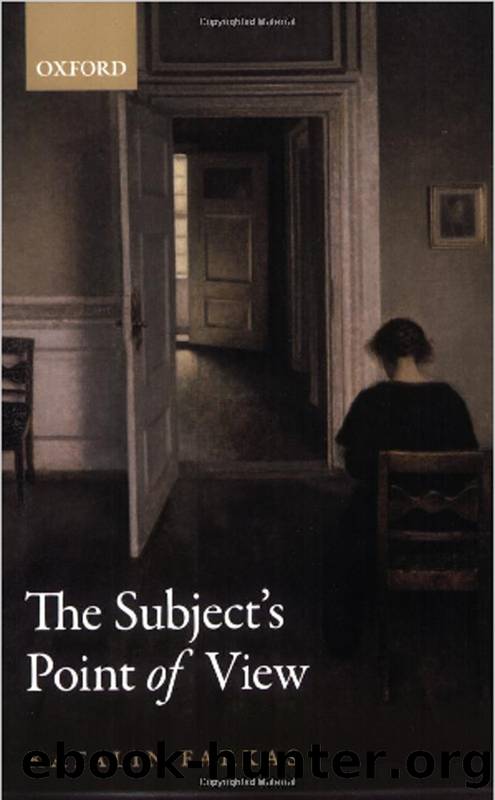The Subject's Point of View by Farkas Katalin;

Author:Farkas, Katalin;
Language: eng
Format: epub
Publisher: Oxford University Press USA - OSO
Published: 2010-06-14T16:00:00+00:00
4.8 Possible Objections to Phenomenal Properties
The suggestion is that the defining feature of Twin situations is that all the Twins’ thoughts and experiences share their phenomenal properties (throughout their mental history). I myself think that this is the most intuitive account of the Twin situations, and I am clearly not alone in this. However, the notion of phenomenal properties involved in this suggestion is open to some objections, which need to be answered.
First, I said that, if two experiences involve things ‘seeming the same’, they have the same phenomenal properties. It has been argued that the notion of phenomenal properties required by this claim is incoherent, since the ‘seem the same’ relation is not transitive, but the relation of identity of properties—as any relation of identity—should be transitive (see Dummett 1970: 268; Everett 1996).
Secondly, it has to be a common ground between externalists and internalists that the experiences of Twins are indistinguishable, since they define their disagreement in terms of their verdict about the Twin situations. If my account of their relation is right, the Twin experiences share their phenomenal properties. An externalist will then say that, even though the phenomenal characters are the same, the representational or intentional contents are different—Oscar’s experience represents H2O, Twin Oscar’s experience represents XYZ. This involves a separation between the phenomenal and intentional features of experiences. However, some defenders of the so-called representational theories of perception identify the phenomenal character with the intentional content of experiences. On these views, all mental features of a perceptual experience are to be understood in terms of what these experiences represent. The phenomenal character of experience is given by how things seem to the subject, and seemings are characterized in terms of their contents. If this view is combined with content externalism—as, for example, in the case of Fred Dretske (1995) or Micheal Tye (1995)—then we get the result that it seems to Oscar that he is tasting water, while it seems to Twin Oscar that he is tasting twater, and therefore the contents of seemings, and hence the phenomenal characters, are different.
The classical Twin Earth arguments aim to establish externalism about content; but there are also positions that extend the externalist claim to other mental features. For example, Timothy Williamson (2000) defends externalism about certain propositional attitudes. The third challenge to my notion of phenomenal sameness could be coming from certain defenders of yet another version of externalism about the mental: the disjunctive theory of perception, as defended, for example, by John McDowell (1982) and M. G. F. Martin (2004, 2005). Disjunctivists claim that, in a pair of situations like the one I described above, about seeing and hallucinating about a teacup, the most specific mental kind exemplified by the veridical perception (VP) is different from the most specific mental kind of a corresponding hallucination (H). Since it is generally agreed that a subject could be in the same internal state in an actual VP and a counterfactual H (or the other way around), disjunctivism is a form of externalism about the mental.
Download
This site does not store any files on its server. We only index and link to content provided by other sites. Please contact the content providers to delete copyright contents if any and email us, we'll remove relevant links or contents immediately.
| Anthropology | Archaeology |
| Philosophy | Politics & Government |
| Social Sciences | Sociology |
| Women's Studies |
Inward by Yung Pueblo(950)
The Good Book by A. C. Grayling(917)
A Meaning to Life by Michael Ruse(650)
Rings of Saturn by W. G. Sebald(640)
Letting Go: The Pathway of Surrender by David R. Hawkins(600)
Corporate Psychopathy by Katarina Fritzon & Nathan Brooks & Simon Croom(558)
The Jesus Delusion by Heinz-Werner Kubitza(550)
The Most Human Human: What Talking With Computers Teaches Us About What It Means to Be Alive by Brian Christian(541)
The Astrology of Love & Sex by Annabel Gat(537)
A Wonderful Life by Frank Martela PhD(525)
The Feeling of Life Itself by Christof Koch;(481)
The Most Human Human: What Talking with Computers Teaches Us About What It Means to Be Alive by Christian Brian(448)
Choiceless Awareness by J. Krishnamurti(416)
Love Unveiled by A. H. Almaas(409)
An End to Upside Down Living by Gober Mark(402)
A Burst of Conscious Light by Andrew Silverman(387)
The Ecological Thought by Timothy Morton(374)
Design, Mediation, and the Posthuman by Dennis M. Weiss(374)
Lin Yutang - the Importance of Living by Lin Yutang(373)
